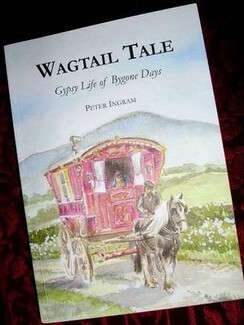Book review: Wagtail Tale by Peter Ingram

Wagtail Tale: Gypsy Life of Bygone Days
By Peter Ingram
Paperback, 330 pages
Limes End Yard Publishing, 2014
Review by Damian Le Bas
PAINTINGS of gilded wagons and gently smoking camp-fires down old country lanes have adorned the walls of British homes for a hundred years. To most people, it’s a quaint and romantic scene, which represents a time of life that has since passed into history. But what was the life behind this idyllic scene actually like? If you’ve ever wondered, you won’t find many better depictions than the one given by renowned wagon restorer and painter Peter Ingram in this book.
Wagtail Tale is not an easy book to sum up: it’s not just a story, and it’s not just a book about Romany culture. It’s a complete picture of how the last of the old wagon-dwelling Travellers lived in the middle of the last century, and it makes a fine case for why their way of life deserves to be remembered as a unique part of British history.
It tells the story of old John and Genty, an old-fashioned Romany couple from the Welsh borders who got married young and were rarely seen apart during their long marriage. We meet the old couple in the autumn of their life, when their routine is suddenly interrupted by the arrival of Jimmy and Katie, their young grandchildren, who need looking after because their mother has hit hard times.
What sets this book apart is the author’s genuine experience of how the tools and techniques actually worked. From the old trades of flower and basket making, to how you go about making a basic bow-top out of an old dray using rods and canvas, Mr Ingram is writing from his own experience of carrying out these trades of yesteryear. The woods and materials you need, the thickness of the sticks, the technique of drawing them against the peg knife: on every page, you are drawn into the reality of fully-fledged way of life, which was lived day to day through hardship and joy by generations of Gypsy people. There are nice illustrations by Katie Morgan on many of the pages, too.
The old Romany tongue is used throughout the book, and the accompanying CD. The author spoke Romanes round the camp-fire with old Travelling people who have long since passed away, but their old Gypsy words for kettles and catapults, meals and magpies, whistles, wagons and work are all here, as is the tuneful old rural way that the Gypsies used to speak English alongside them. There’s a good taste of all this on a CD that Ingram and Cath Watkins have made to go with the book, which also features some good old fiddle playing and traditional songs.
Some of us are lucky enough to own a wagon or a nice dray nowadays; others have to make do with a china model or a mirror with a laser-etched picture of a vardo and gry. In one way it’s true that the Gypsy way of life simply moved with the times: the modest power of the horse gave way to the diesel engine, and wooden wheels moved aside for durable alloy and steel.
But there’s no escaping that something precious was lost when the wagon-time ended. Whenever someone asks me why Travellers don’t just modernise and forget the history and language of the old days; why we insist on keeping it going as best we can at the horse fairs, why we still keep horses and old trolleys and vardos in garages and barns, I’ll tell them to read this book so they don’t need to ask me again.
-
To order a copy of Wagtail Tale, priced at £12.00 plus £3.00 postage and packing, email limesendyard@outlook.com, or call 01420 511486, or write to Limes End Yard Publishing, Selborne, Hampshire, GU34 3LD.
A CD that complements the book is also available by contacting the publisher (at the above address): Old Fiddle Tunes and Sentimental Songs of Welsh Border Gypsies, by Peter Ingram with Cathy Watkins on the fiddle. Copies of the CD are £6.00 including postage.
Price for the book and CD together is £20.00 including postage.